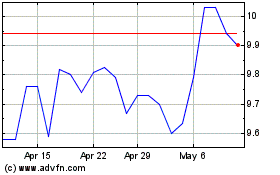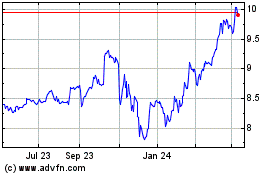Australia's Santos Seeks to Soothe Investor Worries; Shares Rise
22 January 2016 - 4:10PM
Dow Jones News
SYDNEY—Australian energy company Santos Ltd. moved to reassure
investors about its financial health as oil prices continue to fall
world-wide, even as it warned of asset write-downs and reductions
to its oil and gas reserves.
Santos said recent moves to raise 3.5 billion Australian dollars
(US$2.5 billion) by selling assets and new shares had helped to
bolster its balance sheet, despite mounting investor concerns that
its dividend may be at risk if oil prices don't rebound soon.
As recently as mid-November, management said it expected to
declare a final dividend of 5 Australian cents a share, which is
consistent with its policy of returning 40% of underlying net
profits to shareholders.
"Santos is well placed to withstand an extended period of low
oil prices, with A$4.8 billion in cash and committed undrawn debt
facilities, and no material debt maturities until 2019," Executive
Chairman Peter Coates said. "We are continuing to focus on reducing
our capital expenditure and will build upon the significant
improvements that we have made to our operating efficiency."
His comments contributed to Santos's share price recently rising
9% to A$2.79, outperforming the benchmark S&P/ASX 200, which
was up 1.1%.
Santos said it spent A$1.66 billion on existing projects and new
developments in 2015, including exploring for more oil and natural
gas. That was lower than a reduced annual capex target of A$1.8
billion and is 54% lower than a year earlier.
Skittishness about Santos's financial health has grown as oil
prices have tumbled; They fell below US$27 a barrel in the U.S. on
Wednesday due to a global supply glut and shaky demand outlook as
China's economy cools. Oil prices in New York rebounded 4.2% on
Thursday.
The Adelaide-based company had A$6.55 billion in net debt at the
end of December, which is a legacy of its aggressive expansion from
a midsize Australian company focused on oil production in the
Outback to a significant player in the global trade of natural gas
by sea.
Santos owns a minority stake in the US$19 billion PNG LNG
facility in Papua New Guinea and operates the GLNG plant in eastern
Australia's Queensland state that shipped its first cargo of
liquefied natural gas to Asian customers in October. LNG is a
natural gas that is cooled to a liquid form so it can be
transported by ship.
The deepening oil-price slump has squeezed revenue expected from
LNG shipments and restricted Santos's ability to repay its debt.
That has contributed to Santos's share price plunging by about 60%
over the past year, and left the 62-year-old company vulnerable to
a takeover.
In October, Santos said it rejected as too low a A$7.14 billion
bid from Bermuda-based Scepter Partners—a private-equity firm
backed by sovereign investors and wealthy members of Asian and
Persian Gulf-based ruling families. The indicative offer was worth
A$6.88 a share in cash, well above Santos's Thursday closing price
of A$2.56.
Some analysts believe the company needs to consider deals,
rather than risk everything on a recovery in oil prices. Earlier
this month, Credit Suisse said Santos should look to combine with
Origin Energy Ltd. to create a larger company focused on
exploration and production. It suggested Origin's utilities
business could then be spun out.
On Friday, Santos said it produced 14.9 million barrels of oil
equivalent in the three months through December. That brought its
annual production to 57.7 million barrels of oil equivalent—up 7%
from 2014—which represented its highest output in nearly a
decade.
Write to David Winning at david.winning@wsj.com
(END) Dow Jones Newswires
January 21, 2016 23:55 ET (04:55 GMT)
Copyright (c) 2016 Dow Jones & Company, Inc.
Origin Energy (ASX:ORG)
Historical Stock Chart
From Mar 2024 to Apr 2024

Origin Energy (ASX:ORG)
Historical Stock Chart
From Apr 2023 to Apr 2024
